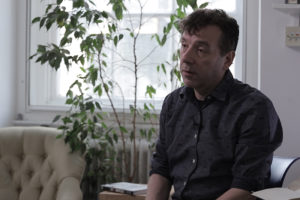Evaluations of Talent
Neuroscientist Mahzarin Banaji on objective music perception, failing at assessing people, and arranged marria...
The video is a part of the project British Scientists produced in collaboration between Serious Science and the British Council.
As psychologists we have many different techniques that we can use. Certainly when we are dealing with patients with depression we frequently use techniques like cognitive behavioral therapy. But what we are beginning to realize more and more is that many of these people with neuropsychiatric disorders and brain injury actually have cognitive problems. So what’s being used by psychologists quite frequently now is what we call cognitive training. And that’s the way we can boost cognition and we don’t use drugs to do this, we just do it through the method of getting people to exercise their brain using a fixed technique. Usually cognitive training is delivered on a computer. But what we also found is that healthy people can benefit from this kind of cognitive training.
So, there is a work by Torkel Klingberg at the Karolinska Institute where he showed that doing a cognitive training of working memory in healthy people of a quite an extended period of time will actually lead to changes and activations in the brain, but will also lead to changes in D1 receptors in the brain. So this is really interesting how you can modify these circuits in the brain. And some years ago with my colleague we wrote a paper for the British Medical Journal called “Use It or Lose It”. And it was really all about the fact that we have to work areas of the brain if we want to keep them active. So, in the way that people do crossword, puzzles, Sudoku or other ways to sort of go on lifelong learning courses to really stimulate their brain, this is the very important thing to do. And we really need to do this lifelong.
So, the trouble with cognitive training is that usually you have to come in to a hospital starting to do this and frequently you have to have specialized stuff to help you go through the programs and things like this. So, this can be expensive and inconvenient. In my laboratory we thought how can we modify this cognitive training in order to make it fun, enjoyable and easy to access. So what we decided to do is essentially to gamify the cognitive training. In my lab we got a games developer to come and work with us. And we used studies that we had over 20 years to look at the neuropsychological benefits and the neuroimaging benefits of doing these tasks in the areas of the brain that they activated. And one of the tasks that we particularly were interested in was episodic memory. That is the type of memory that we use every day. We know that episodic memory is related to functionality in Schizophrenia and also in Alzheimer’s disease. So we know that if we could boost episodic memory we would probably can boost functional outcome.
And what we did was we used a wizard motif. Everybody knows about Harry Potter and everybody is interested in it and it seemed that that would be really engaging for the people with Schizophrenia who we were trying to boost their memory for. So, we worked with that kind of thing. We utilized the data that we had showing how we could activate that area of the brain. We had already published a paper in Neuropsychologia showing that when people were lying in a scanner (we looked at elderly people and people with mild cognitive impairment) and doing a Paired Associates Learning (PAL) Test we got a nice activation of hippocampal area, so we knew there was a way to stimulate and activate that area of the brain. So we essentially put that into a game. And then we piloted on people with Schizophrenia to make sure that they found it interesting, enjoyable, they got it. Thus, this is a motivating way to improve people’s cognitive function. So, it is essentially the cognitive training that psychologists accept as being very beneficial, but it’s put into a game. And there are games companies now, they call themselves “serious” game companies, where they are trying to work to improve people’s cognitive function through these means in healthy people too. So, it’s a good thing for us to do because everybody likes to play games and we might play the games that are good for us. But of course, not all games are good for us. These games that I am talking about have been developed within evidence base behind them. So, it’s very important that there’s scientific evidence showing that these games do actually work and they are successful.
In this game the way that we decided to do it is very much based on a kind of episodic memory theme. You can fight with wizards and things like that. But basically what you have to do, what the hippocampus in the brain does is remember the location of objects in space. So this game is very much based on that. And what happens is as you remember things you get rewarded with spells that you can then fight against other wizards. And so it is a very engaging type of thing. And the nice thing is that the game is adjusted to help you with your motivation, so that if you’re doing well it pushes you on and you get more challenge for the game and you can gain more things and cast more spells and fight other wizards, then move along the trajectory. But if you are having a difficulty, it’s bringing you back down again. So it’s nicely titrated in the way that games people do to make sure that you’re learning and remembering as much as you can and it keeps giving you more and more levels of difficulty. And you keep encountering different situations with wizards, who are trying to attack you, and you are trying to attack them and then you are successful and you get a lot of rewards for doing that.
What we found was that if we ask schizophrenic patients to train on this test for 8 hours over one month, not only does the episodic memory improve, but we also got improvements in the activities of daily living. So that when we looked at the global functioning through the GAF test we found that they also improved on that. So it wasn’t just limited to episodic memory, they also got improvements on the psychosocial functioning with the test. When we asked people with Schizophrenia to play that game for 8 hours over one month we found that not only did they get gains on episodic memory, but we also found that their psychosocial functioning improved. So the game really had benefits that weren’t just restricted to the memory, but they also take place in psychosocial functioning in every day activities.
People are going to play games. So, they should play games that are good for their brain health and also that are motivating maybe improve their positive outlook on life, because we can adjust the way we see the world. That what the cognitive behavior treatment is all about. But you need to use games when there is an evidence base to them, because some games don’t really have the same effects. There is no neuropsychological or neuroimaging evidences that show that they are having effects on behavior and on the brain. These games that are based on a long history of data do have. One way that we can use games is both for people with neuropsychiatric disorders and brain injury. For instance, we are currently working with people with mild cognitive impairment this is the early stage of Alzheimer’s disease, and we are working with the specific group, which is called amnestic mild cognitive impairment. And their progression to Alzheimer’s disease is now recognized.
If you can activate those areas of the brain that are first affected in Alzheimer’s disease, such as a hippocampal formation, you may find that you can keep those areas’ function for longer and it will delay the worst outcomes of some of these disorders.
We also know that in healthy people there is a deterioration in the cognition over time. So we function at the highest level in our 20s and then it starts to decline. And of course, as healthy people we have a lot of ways, strategies (it’s called experience) of how to overcome these problems – for example, that memory is not always as good as it used to be. But these games may be a great way to actually activate these areas of the brain and not just in the area of memory but we can also think about attention, because attention is so important.

Neuroscientist Mahzarin Banaji on objective music perception, failing at assessing people, and arranged marria...

Physicist Jonathan Butterworth on the term ‘fundamental’, the forces of the Standard model and why gravity is ...

Biologist Steven Benner on artificial life, bioengineering, and challenges for synthetic biology